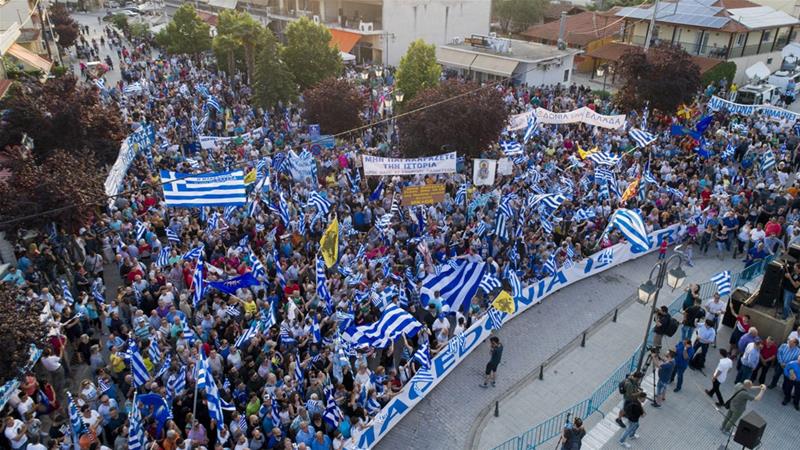Divided North Macedonia votes for new president
Voters split on nation’s name change choose between ruling party candidate Pendarovski and VMRO’s Siljanovska-Davkova.
The runoff election for a new president is under way in the newly-named North Macedonia amid deep divisions over the change in country’s name to mollify Greece and pave the way for NATO and European Union (EU) memberships.
Polls in the country opened at 7am local time (05:00 GMT) on Sunday and will close at 7pm (17:00GMT), with the first preliminary results due two hours later.
A total of 1.8 million eligible voters will choose between the governing Social Democrats’ (SDSM) candidate Stevo Pendarovski and the opposition favourite Gordana Siljanovska-Davkova of the nationalist VMRO. Both finished in a near dead heat in the first round last month.
Their tie reflected a split between pro-West and nationalist camps who have clashed over the government’s recent move to change the country’s name to North Macedonia, ending a 28-year dispute with Greece.
But a record-low turnout in the first round, at barely over 41 percent, also reflected a failure to galvanise voters.
If the turnout sinks below 40 percent on Sunday, the entire poll will be annulled, threatening a new period of political uncertainty in one of Europe’s poorest states.
“The country has been divided for a long time and I think one of the first duties of the new president must be to work to reduce this division,” 70-year-old voter Roza Jovanova told AFP news agency while casting her ballot in capital Skopje.
Tight race
In February, the country added “North” to its name to differentiate itself from the ancient Greek province of Macedonia. In return, Athens removed obstacles for Skopje to become a member of NATO.
Skopje is also hoping that, with Greece’s veto lifted, the country will receive an invitation to begin EU membership talks in June.
Pendarovski supports the deal with Greece while Siljanovska-Davkova and the current president, opposition-backed Gjorge Ivanov of the VMRO, want to join NATO and the EU, but are critical of the agreement and name change.
Al Jazeera’s Maja Blazevska, reporting from Skopje, said: “We are expecting a photo finish as the exit polls suggest a very tight presidential race.”
“The biggest question after these elections will be accepting the new name of the country,” she added.
The presidency is a largely ceremonial post in North Macedonia, but the leader is the supreme commander of the armed forces and also signs off on parliamentary legislation.
The refusal of outgoing President Ivanov, a nationalist, to sign some bills backed by parliament has delayed the implementation of key laws, including one on the wider use of the Albanian language – 18 years after an ethnic Albanian uprising that pushed Macedonia to the brink of civil war.
But Ivanov had no authority to block the constitutional amendments passed earlier this year by a two-thirds majority in parliament that enabled the name change to North Macedonia.
The small, land-locked country has weathered repeated bouts of political turmoil in recent years, with nearly 10 elections in the past decade doing little to boost public faith in politicians.
Low wages and high unemployment have deepened the disillusionment.
Prime Minister Zoran Zaev is confident “the elections will succeed”, but if not, he said he would call a snap parliamentary poll.
Inside Story
Macedonia: What’s in a name?
Source: Read Full Article




